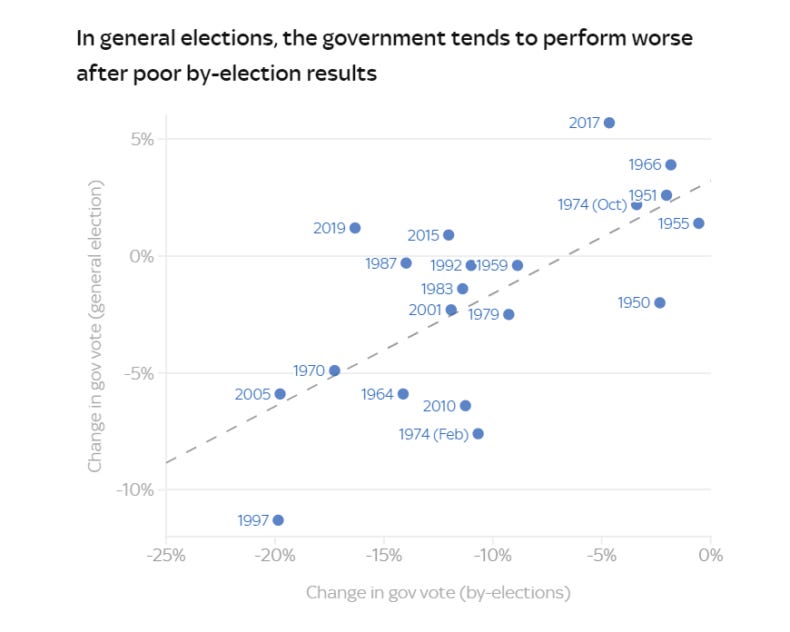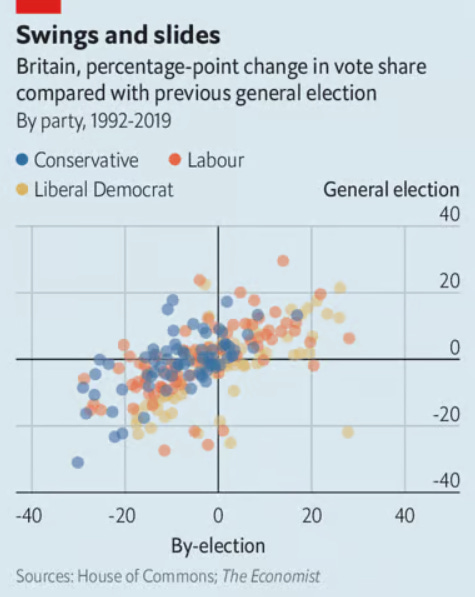Do by-election results predict general election results?
Welcome to the 95th edition of The Week in Polls, which takes a swerve from looking at opinion polls to looking at the real polls and asks: do Parliamentary by-election results foretell general election outcomes? Throw cynicism at the question and you get the answer yes if you’ve won and no if you’ve lost. Luckily, we can also throw data and graphs at the question too.
Then it’s a look at the latest voting intention polls followed by, for paid-for subscribers, 10 insights from the last week’s polling and analysis. (If you’re a free subscriber, sign up for a free trial here to see what you’re missing.)
But first this week’s weary sigh is triggered by the Daily Express who last week called a one point rise in Conservative support, well below the level of a statistically significant change, “a boost in the polls which could be the first sign of hope for a turnaround”. Poetically, the very next poll from the very same pollster put the Conservatives down one point, back to where things started.
As ever, if you have any feedback or questions prompted by what follows, or spotted some other recent polling you’d like to see covered, just hit reply. I personally read every response.
Been forwarded this email by someone else? Sign up to get your own copy here.
Already a reader and know others who might enjoy this newsletter? Refer a friend and you can get up to 6 months of free subscription to the paid-for version.
Want to know more about political polling? Get my book Polling UnPacked: the history, uses and abuses of political opinion polling.
Do Parliamentary by-election results foretell general election results?
Whenever there is a big swing in a Parliamentary by-election, a dramatic change of winning party or, especially, both, there are some – usually sympathetic to the losing side – who decry the significance of the result. Then there are others – usually sympathetic to the winning side – who herald it as a sign of big political changes to come.
What does the evidence tells us, though, about the predictive power of by-elections, either on the next general election result overall or on the next result in the constituency itself?
By-elections predict general election outcomes, part 1
Research from Paul Whiteley says yes, Parliamentary by-elections do foretell the outcome of the subsequent general election:
The argument that by-elections are no guide to general elections is not true if one looks at a lot of them. To see this, we can examine the Conservative Party’s performance in all 474 [at the time of writing] by-elections held in the UK since 1945 and compare them with its performance in subsequent general elections…
The chart shows net gains in by-elections since 1945 for the Conservatives compared with net gains in House of Commons seats in subsequent general elections. The relationship between these is very strong (r=0.70)…
The modelling shows that a net win of one by-election by the Conservatives predicts an increase of 1.5% in the number of seats the party wins in a general election. This translates into just over nine extra seats in the House of Commons. Equally a net loss of a by-election reduces their House of Commons seat share by the same amount. This exercise is of course subject to errors, since the relationship is not perfect.
The outlier in the bottom left is the 1992-1997 Parliament. This Parliament, following the latest Conservative defeats, is now even further over to the left than that outlier, though we don’t yet know how far up or down the graph it will be.
By-elections predict general election outcomes, part 2
Second, we have similar conclusions about the predictive powers of by-elections from Will Jennings (full piece, which is well worth a read, here):
As he writes:
Historically, by-elections have offered a yardstick for the future electoral prospects of governments. Every government tends to lose support in by-elections, but those that repeatedly lose badly tend to fare worse at subsequent general elections.
Once again, 1997 is an outlier: although it saw a then record number of Conservative losses, and a record vote share decline, the actual result when it came was even worse than the by-election results would have predicted.
By-elections partly predict constituency results next time around
Both of those pieces of research are about general election outcomes overall. But what about the result in the constituency itself?
Here we have data from The Economist which again suggests a predictive power:
The Economist built a simple model to predict a party’s general-election vote share in a given seat based on its performance in a by-election in that same seat. As a rule of thumb, roughly half of the change in a party’s vote share is carried over from by-elections to general elections (see chart).
Note: because this analysis looks at vote share changes rather than simply winners and losers, I find it more persuasive than the analysis from Electoral Calculus.
In conclusion…
Parliamentary by-elections do have a loose predictive power. Not perfect, but much better than the sort of self-indulgent Rorschach-like punditry that Rob Hutton so nicely caricatures for The Critic. Caricatures which Michael Howard chose to live up to so closely.
National voting intention polls
Despite a brief flurry of excitement when a Savanta poll came out, showing Labour’s support down by five points, the overall picture is still very much the same. Insert the usual references to Michael Foot, the Duke of Wellington and how long it it since the Conservatives were last on more than 30%.
What is new is the appearance of another pollster, Whitestone Insight, founded by Andrew Hawkins. He previously founded ComRes which was later taken over by Savanta. Their first poll had a sample size of over 13,000 so watch out for them using that to the full to produce more analysis, and so more attention for this first poll.
Here are the latest figures from each currently active pollster:
For more details and updates through the week, see my daily updated table here and for all the historic figures, including Parliamentary by-election polls, see PollBase.
Last week’s edition
What does the polling really say on Europe?
My privacy policy and related legal information is available here. Links to purchase books online are usually affiliate links which pay a commission for each sale. Please note that if you are subscribed to other email lists of mine, unsubscribing from this list will not automatically remove you from the other lists. If you wish to be removed from all lists, simply hit reply and let me know.
Farewell, John Curtice - and other polling news
The following 10 findings from the most recent polls and analysis are for paying subscribers only, but you can sign up for a free trial to read them straight away.
Keep reading with a 7-day free trial
Subscribe to The Week in Polls to keep reading this post and get 7 days of free access to the full post archives.






